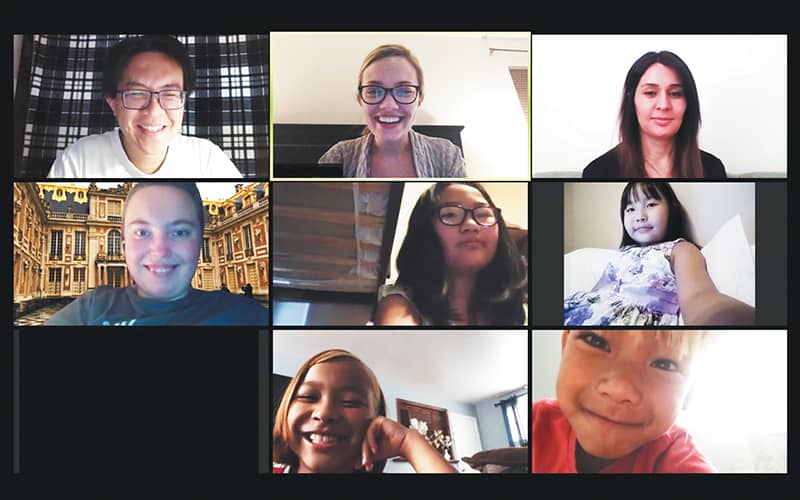
For the last month, students in Metro Nashville Public Schools have been attending classes virtually, expected to participate in live, synchronous classes every day and complete additional assignments.
Navigating the technology and staying organized and motivated has been a challenge for many students and their families.
Virtual learning can be especially difficult for families who came to the United States as refugees and are not native English speakers. That’s where Catholic Charities of Tennessee is stepping in to help.
To support refugee children attending MNPS schools, the agency is matching each refugee child they serve with a “super supporter” to check in with them at least once a week and help them with all aspects of virtual learning.
Each super supporter connects the family with their child’s school, so they can receive necessary correspondence; ensures they have the proper technology setup at home and coaches them on the digital platforms, and provides a translated MNPS resource packet.
The super supporters also connect with each child’s teacher and meet with the child virtually or in person each week to provide support and make sure they are staying on track with their classes.
“One of the greatest things about children is how resilient they are,” said Anna Notestine, Catholic Charities’ refugee youth program coordinator who oversees the super supporters.
Despite the challenges the children have faced, living in refugee camps, settling in a new country, coping with the coronavirus pandemic, and now navigating virtual school, “they will rise above and do really well,” Notestine said.
Catholic Charities has offered in-person after school and summer programming for refugee youth for years, but they had to shift that to a virtual format for the summer of 2020. That’s when Charities’ staff first started the process of making sure that all the children had the devices and internet access they needed to participate in online programming.
“The summer program helped us understand where the kids were at with technology,” Notestine said.
At first, many families did not have what they needed, landing on the wrong side of the digital divide. “If you have the right technology you can be connected, but if not, it can be very isolating, and you’re left out,” Notestine said.
Metro Nashville Public Schools and Catholic Charities have been working hard to make sure all children have laptops and hotspots so they can access their virtual learning platforms from home.
Catholic Charities Super Supporter Kadijah Lockhart has been working closely with 17 different students from the refugee youth program to make sure they get off to a good start this school year. One of the first things she did was don her mask and gloves and make a personal visit to each family’s home to meet them and offer hands-on tech support if needed.
“I wanted the parents to be comfortable with me,” Lockhart said, since their children would be having close contact with her for at least the first quarter of school.
Her students’ comfort level with technology varies widely. “Our newest arrivals had no technology back home and have no idea how to work it,” Lockhart said.
But some older kids may have their own smart phones and be totally comfortable with navigating different types of technology.
During their one-on-one sessions, they will share their laptop screens so they can work through homework questions together. “A lot of kids text me and I can call them for homework help,” Lockhart said. “That’s what I’m here for.”
Catholic Charities super supporters are currently assisting about 200 refugee youth across all grade levels. “We’re really prioritizing the families that have arrived in the last two years, the ones most likely to need support,” Notestine said.
The children speak a number of different languages including Arabic, Swahili, Burmese, and Somali. Lockhart sometimes needs a translator on the line when she’s helping a student with homework, which adds another layer of complexity to the process.
Now one month into virtual learning for this school year, students and their support teams are settling into a routine. “The most challenging part was the initial setup,” Notestine said, making sure every student had what they needed and knew how to use it.
With the technology logistics mostly settled, Catholic Charities can re-focus on meeting the full range of children’s needs and goals. They can also make sure they have access to any additional support they may need that would traditionally come through the public school system, such as food or counseling.
“We want to serve them in a holistic way,” Notestine said.
Virtual learning presents a number of challenges, but some of the refugee students “love learning this way,” Notestine said. “They’re self-motivated and they like the freedom of it.”









